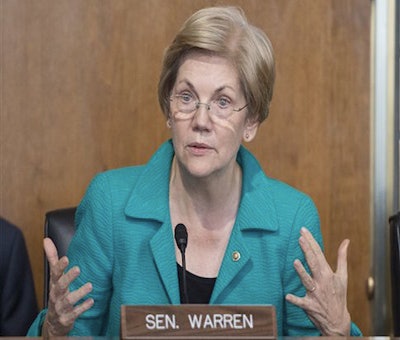The U.S. Department of Education announced late Tuesday that it was reversing course on its plan to award all federal student loans to a single student loan servicer and creating a new “environment” for how it operates — a move that student advocates and even one of the most vocal critics in Congress tepidly hailed as a good move.
“I’m glad the Education Department is changing course, but it will be important to continue watching the Department to evaluate whether its decisions are good for the millions of struggling federal student loan borrowers,” said U.S. Sen. Elizabeth Warren, (D-Mass.), who has accused U.S. Secretary of Education Betsy DeVos of putting the interests of business ahead of the interests of students.
 U.S. Senator Elizabeth Warren
U.S. Senator Elizabeth WarrenWarren made her remarks in a statement after DeVos announced that the Education Department was cancelling its student loan solicitation.
The cancellation was buried in a press release that stated the Federal Student Aid agency was embarking upon an initiative billed as its “Next Generation Processing and Servicing Environment.”
FSA is charged with overseeing federal student aid to some 42 million loan borrowers.
“The FSA Student Loan Program represents the equivalent of being the largest special purpose consumer bank in the world,” Dr. A. Wayne Johnson, the newly appointed Chief Operating Officer at FSA, said in a statement.
“To improve customer service, we will take the best ideas and capabilities available and put them to work for Americans with student loans,” Johnson’s statement said. “When FSA customers transition to the new processing and servicing environment in 2019, they will find a customer support system that is as capable as any in the private sector.
“The result will be a significantly better experience for students — our customers — and meaningful benefits for the American taxpayer.”
Details of the new “environment” were sketchy and non-committal in terms of how many contract servicers would be involved.
The Education Department press release stated that the anticipated FSA Next Generation Processing and Servicing Environment will “provide for a single data processing platform to house all student loan information while at the same time allowing for customer account servicing to be performed either by a single contract servicer or by multiple contract servicers.”
“This new approach is also expected to require separate acquisitions for database housing, system processing and customer account servicing which will allow for maximum flexibility today and into the future,” the department’s statement said. “FSA expects these contemplated changes to the servicing and processing environment to provide the opportunity for additional companies to submit proposals for contracting with FSA.”
DeVos said in a statement that doing what’s best for students “will always be our number one priority.”
“By starting afresh and pursuing a truly modern loan servicing environment, we have a chance to turn what was a good plan into a great one,” Devos said, noting that she hired Johnson “for his extensive private sector expertise, his fresh perspective and his innovative thinking.”
“After just a few weeks on the job, Wayne has already identified potential ways to modernize FSA and to leverage new technology that will not only enhance the customer service experience for borrowers but will also protect taxpayers,” DeVos said in her statement.
Contracts with current FSA student loan servicers expire in 2019, according to the Education Department statement. The new processing and servicing “environment” is expected to be in place before those contracts expire.
FSA said in a statement that the agency is planning a “financial services/student loan industry-wide collaborative information gathering effort” and “will engage various stakeholders and industry technology leaders as it moves along a timeline for future contracting and deployment.”
Justin Draeger, president and CEO of the National Association of Student Financial Aid Administrators, or NASFAA, said his organization applauds the “intended direction the Department is taking to engage with stakeholders to get federal student loan servicing right.”
“The key will be to have strong consumer-centric requirements in the contracts so borrowers can get the best service possible,” Draeger said in a statement. “Instituting a one-stop shop where students can easily access all their loan information is a great first step to help reduce miscommunication between servicers and borrowers.”
“As always, our highest priority will be ensuring that borrowers have a seamless experience that makes loan repayment as easy as possible,” Draeger’s statement said. “We look forward to working with our federal colleagues to make sure that happens.”
Warren noted that Education Department’s cancellation of its plan to award federal student loans to a single servicers came just one day after she and other lawmakers introduced the bipartisan “Student Loan Servicer Performance Accountability Act,” which she said would have forced the Department to cancel their single servicer plan.
Senator Warren’s statement said she had been concerned that DeVos’s original single servicer plan would “dramatically exacerbate the anti-competition problem at the Federal Student Aid office.”
“Congress should pass our bipartisan legislation to ensure that the Department never heads in this direction again,” Senator Warren said.
Jamaal Abdul-Alim can be reached at [email protected] or you can follow him on Twitter @dcwriter360.















